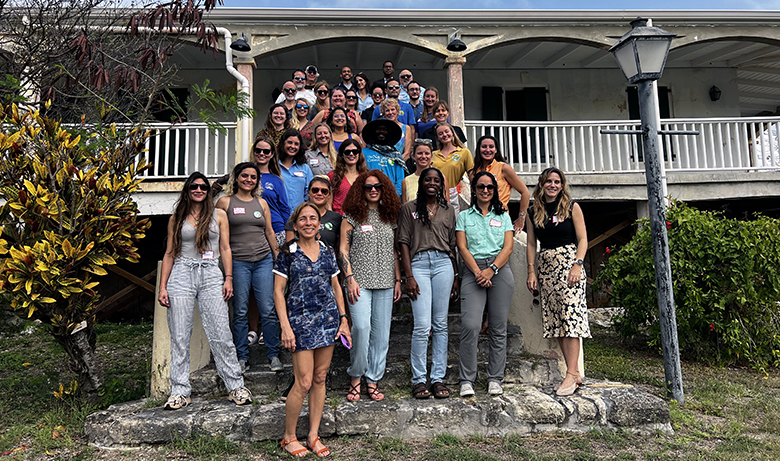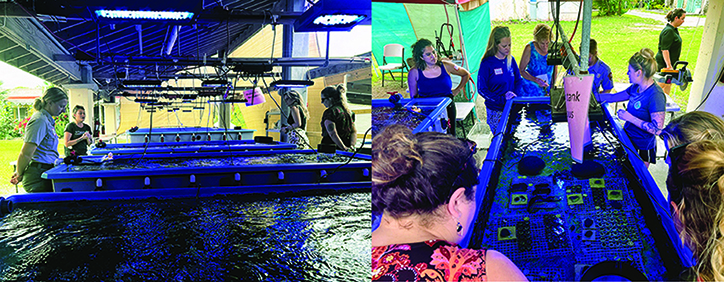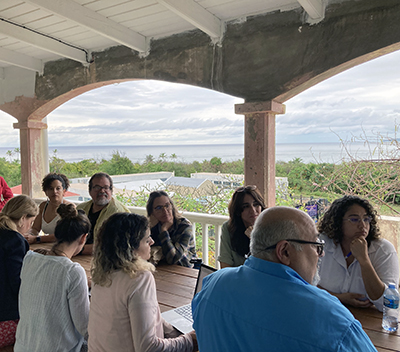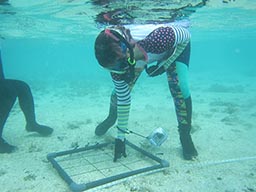- ABOUT US
- PROGRAM AREAS
- CONSERVATION APPROACH
- EDUCATION
- MULTIMEDIA
- Stony coral tissue loss disease
- Prospectus for Stony Coral Tissue Loss Disease: A Present and Growing Threat to Coral Reefs (English) - (Español)
- Stony Coral Tissue Loss Disease: Understanding & Preventing Disease Transmission Fact Sheet
- Release of NOAA's Implementation Plan for Stony Coral Tissue Loss Disease Response and Prevention
- Lessons learned from the U.S. Regional Caribbean Stony Coral Tissue Loss Disease Workshop
- U.S. Coral Reef Task Force's Coral Disease Working Group
Road to Recovery: Sharing knowledge at the 2024 U.S. Caribbean Stony Coral Tissue Loss Disease Workshop
By: Kennedy Wall, Florida Sea Grant
Takeaway: The 2024 U.S. Regional Caribbean Stony Coral Tissue Loss Disease (SCTLD) Workshop convened coral managers, practitioners, and researchers from Florida, Puerto Rico, and the U.S. Virgin Islands (USVI) to exchange information, coordinate disease response efforts, and collaborate on projects across the U.S. Caribbean. The main objectives were to enhance regional coral rescue, share information on bleaching response and monitoring, coordinate restoration planning and implementation, and discuss strategies to expand disease response networks to include other coral disturbances, like bleaching, invasive species, and storm damage.
Over the past several years SCTLD has devastated reefs across the Caribbean, with the cause still unknown. Although research has allowed us to better understand disease dynamics and transmission, there are still many challenges in treating infected corals and managing disease outbreaks. Now, SCTLD is found in most areas of the Caribbean but the amount and severity of the disease continues to ebb and flow with changing environmental conditions. Since 2019, NOAA's Coral Reef Conservation Program has supported workshops to bring together experts to increase collaboration and knowledge exchange for SCTLD in the U.S. Caribbean. This year's workshop was held in St. Croix, U.S. Virgin Islands at The Nature Conservancy (TNC) facility in Estate Little Princess, near Christiansted.

Day 1: The harsh reality
As we gathered at TNC's office, anticipation hung in the air, infused with the shared purpose of exchanging new insights, tackling common challenges head-on, and rekindling personal connections. Many of us met last May in San Juan, Puerto Rico, for the 2023 workshop, so it was nice to see familiar faces and catch up. The workshop began with updates from Florida, Puerto Rico, and USVI on the unfortunate reality of SCTLD and the devastating aftermath it has left all across the Atlantic-Caribbean.
A few common themes across the jurisdictions were evaluating the effectiveness of interventions such as antibiotic treatments, continuing long-term monitoring, and exploring new interventions like evacuating corals from the wild to land-based nurseries. Each jurisdiction shared the implementation of their action plans, outlining concerted efforts to combat SCTLD and other coral stressors.
A few common themes across the jurisdictions were evaluating the effectiveness of interventions such as antibiotic treatments, continuing long-term monitoring, and exploring new interventions like evacuating corals from the wild to land-based nurseries. Each jurisdiction shared the implementation of their action plans, outlining concerted efforts to combat SCTLD and other coral stressors.
The next session brought on a more somber mood, as we debriefed on the 2023 heat stress event and its aftermath. After hearing about each jurisdiction's response strategy to widespread coral bleaching and lessons learned, participants broke into smaller groups to focus on the innovative interventions that different organizations attempted to use to combat coral bleaching. Although we were saddened by the losses of 2023, a shared sense of resilience emerged from this session. We felt that, together, we will be better equipped to manage the next bleaching event.
As a break from workshop sessions, TNC staff lead an in-depth tour of their Coral Innovation Hub. The tour offered a glimpse into their expansive coral rescue operation, including water tables housing rescued coral fragments, microscopy lab, and plans for their forthcoming larval-based propagation expansion. Not only was the tour informative, but TNC staff also did an amazing job highlighting their work with enthusiastic storytelling and interactions.

Day 2: Next steps
The second day began with revisiting a pivotal discussion that started last year—the establishment of a Regional Coral Rescue Network and funding a Regional Coral Rescue Coordinator. It was clear that there is still a pressing need for regional-level collaboration on coral rescue. This will help facilitate resource sharing, streamline coordination of regional coral rescue operations and data management, navigate regional permitting, preserve genetic diversity through gene banking, establish best management practices, and identify new funding sources.
We then heard from partners from USVI and Florida on the development and implementation of their restoration plans and had a discussion to support Puerto Rico and offer recommendations for the development of their plan. Our goal for the afternoon was to head out for a dive at Cane Bay to see the coral restoration in progress there. However, Mother Nature had different plans and due to unfavorable conditions with high winds and heavy rain, we were not able to dive.
Day 3: A path forward
We gathered for one final day to discuss evolving disease response frameworks that may include other coral disturbances. With environmental stressors on the rise, many response programs have naturally shifted their work to address additional threats, whether it be disease, bleaching, large storms, or something else. Florida has already begun this transition through Florida's Coral Reef Resilience Program, and we talked about what that shift might look like in Puerto Rico and USVI. We ended our workshop with a series of fantastic lightning presentations on topics ranging from youth community engagement and herbivore replenishment efforts to vessel groundings and deep coral outplanting.

Like many of my colleagues working in coral conservation, I have felt mentally challenged and emotionally drained by the relentless environmental stresses of the past few years. From SCTLD to bleaching to major storms, it feels like coral reefs, and the people managing them, just cannot catch a break. That being said, it is workshops like this one where I feel inspired by the dedication and hard work invested in conserving our delicate reef ecosystems. I left St. Croix feeling motivated to progress new initiatives, supported by a cohort of people committed to a future with healthy coral reefs across the U.S. Caribbean. I would also like to express gratitude for the workshop planning team and all their efforts. Thanks to NOAA's Coral Program, Florida Sea Grant, Puerto Rico Department of Natural and Environmental Resources, and USVI Department of Planning and Natural Resources for your support, and finally to The Nature Conservancy for hosting us at your beautiful facility on St. Croix!
Other featured stories and products
About Us

The NOAA Coral Reef Conservation Program was established in 2000 by the Coral Reef Conservation Act. Headquartered in Silver Spring, Maryland, the program is part of NOAA's Office for Coastal Management.

The Coral Reef Information System (CoRIS) is the program's information portal that provides access to NOAA coral reef data and products.
Work With US
U.S. Coral Reef Task Force
Funding Opportunities
Employment
Fellowship Program
Contracting Assistance
Graphic Identifier
Featured Stories Archive

Access the archive of featured stories here...
Feedback
Thank you for visiting NOAA’s Coral Reef Conservation Program online. Please take our website satisfaction survey. We welcome your ideas, comments, and feedback. Questions? Email coralreef@noaa.gov.
Stay Connected
Contact Us
NOAA’s Coral Reef Conservation Program
SSMC4, 10th Floor
1305 East West Highway
Silver Spring, MD 20910
coralreef@noaa.gov
